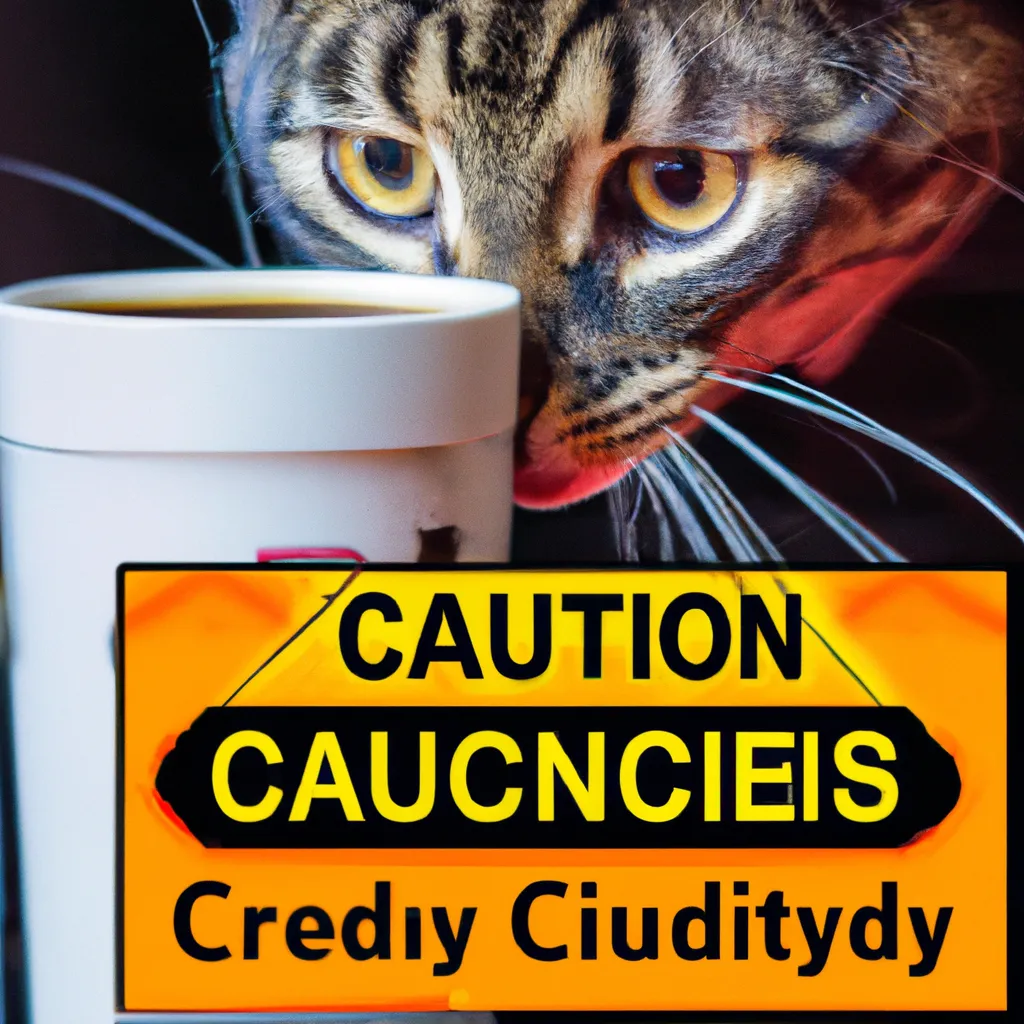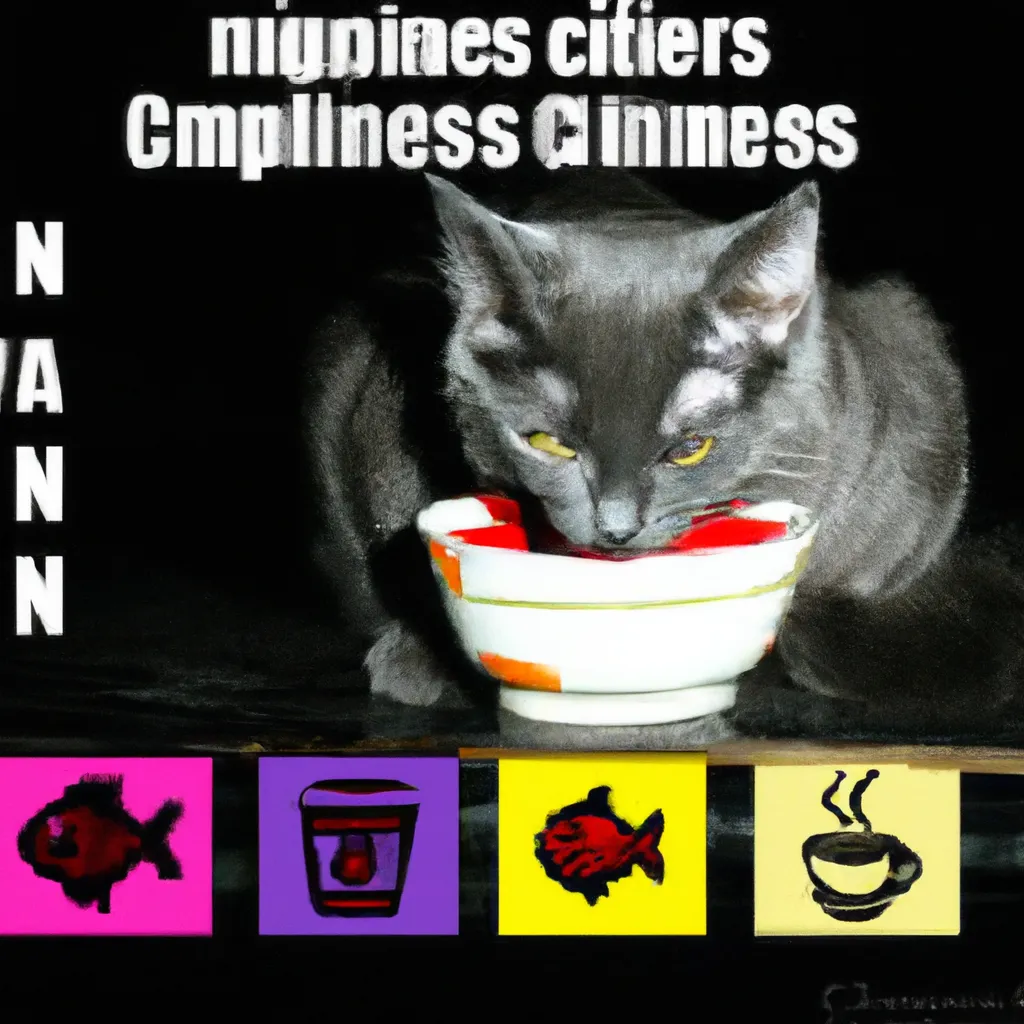Imagine a world where our feline companions, with their mesmerizing eyes and soft purrs, could join us for a cup of morning joe. A world where caffeine, that invigorating elixir of human productivity, could be shared with our beloved pets. Yet, as tantalizing as this scenario may sound to the cat-loving coffee aficionado, it teeters precariously on the precipice of a dangerous reality. In this article, we will delve into the intriguing, yet potentially hazardous, intersection of cats and caffeine.
While caffeine serves as a wake-up call for many of us, the question “Can cats eat caffeine?” poses a myriad of concerns. As connoisseurs of curiosity, cats may indeed show interest in your steaming mug of java, but should they partake? This article will unravel the truth, exploring the potential harm caffeine can inflict on our furry friends, and the symptoms to look out for in case of caffeine poisoning.
It’s not just about knowing what’s harmful, but also about understanding the limits. We’ll delve into the specifics of how much caffeine is toxic to cats, providing you with concrete numbers to ensure your pet’s safety. In a worst-case scenario, if your cat does ingest caffeine, we will guide you on the immediate steps to take, offering practical advice to help your feline friend.
But, what about the cat’s perspective? Do they find the aroma of coffee as enticing as we do? We’ll explore the feline perspective on caffeine, shedding light on whether our coffee habits are intriguing or repelling to them. We will also discuss if there’s any silver lining – could caffeine offer any health benefits to cats?
Lastly, we’ll explore safe alternatives to caffeine for cats, providing you with a myriad of options to keep your kitty energized and happy, without the risk. As we conclude, we’ll discuss the best food for cats, ensuring that your pet’s nutritional needs are met in the best possible way. So, buckle up, dear reader, for a caffeinated journey into the world of cats, where curiosity meets caution, and knowledge is the key to ensuring the health and happiness of our feline friends.
Is caffeine Bad for Cats?
Yes, indeed, caffeine is harmful to our feline companions. Cats, being obligate carnivores, lack the necessary enzymes to metabolize caffeine effectively, leading to potential toxicosis. Ingesting caffeine, found in entities such as coffee, tea, energy drinks, and certain medications, can result in symptoms ranging from restlessness and rapid breathing to tremors, heart palpitations, and in severe cases, even death. It’s crucial to keep these caffeine-containing substances out of paw’s reach to ensure the safety and well-being of our beloved kitty friends. In essence, the adage “curiosity killed the cat” holds some truth here; it’s our responsibility to protect our curious feline friends from the potentially lethal effects of caffeine.
Why is caffeine bad for cats?
Absolutely, cats should not consume caffeine, as it is highly toxic for them. The primary reason for caffeine’s detrimental effects on our feline companions is that their bodies cannot metabolize it as efficiently as humans can. This slow breakdown of caffeine in their system leads to prolonged exposure and amplified effects, which can cause serious health problems. Theobromine, a component of caffeine, is particularly harmful as it can stimulate the cat’s nervous system and cardiovascular system, potentially leading to conditions such as rapid heart rate, hypertension, and even seizures.
What are the symptoms of caffeine Poisoning in Cats?
Recognizing the symptoms of caffeine poisoning in cats is crucial for their well-being. The telltale signs typically emerge within a few hours after ingestion and may include restlessness, rapid breathing, heart palpitations, muscle tremors, and fits of hyperactivity. More severe symptoms can escalate to vomiting, diarrhea, increased thirst, and elevated body temperature. In extreme cases, cats may suffer from seizures or collapse. If you suspect your cat has ingested caffeine, it is imperative to seek immediate veterinary care, as this is a potentially life-threatening situation.

How much caffeine is toxic to cats?
Just a whisker’s width of caffeine can be toxic to our feline friends, as cats are extremely sensitive to this stimulant. In fact, ingesting as little as 20 milligrams of caffeine — roughly the amount found in a small bite of chocolate or a sip of coffee — can result in mild to moderate symptoms of caffeine toxicity in cats. These symptoms may include restlessness, rapid breathing, heart palpitations, muscle tremors, and fits. In severe cases, where a cat has consumed around 150 milligrams of caffeine or more, life-threatening conditions such as irregular heartbeat and seizures can occur. As a cat aficionado, it’s crucial to remember that our curious companions often have a knack for getting their paws on things they shouldn’t, so let’s keep those cups of joe, tea bags, and chocolate treats well out of their reach. After all, a purring cat is a sight to behold, but a jittery, caffeine-affected cat is a heartache no cat lover wants to experience.
Can Cats Die From caffeine?
Indeed, cats can die from caffeine. Our feline companions, while curious and adventurous, are particularly sensitive to substances like caffeine. Consuming caffeine, even in small amounts, can lead to severe health complications such as rapid breathing, restlessness, heart palpitations, and in extreme cases, death. It’s vital to keep caffeinated products like coffee, tea, energy drinks, and certain medications out of their reach. Remember, cats can’t metabolize caffeine as humans do, making it a potentially lethal substance for them. So, in the interest of your cat’s well-being, it’s best to keep their diet caffeine-free.
What to do if cat ate caffeine? How to help?
If your feline friend has ingested caffeine, it’s vital to act swiftly and consult a veterinarian immediately, as caffeine is toxic to cats and can lead to serious health issues. Cats are exceptionally sensitive to caffeine, and even small amounts can cause caffeine poisoning, manifesting symptoms such as restlessness, rapid breathing, heart palpitations, muscle tremors, and fits. To help your cat, ensure that you remove any remaining sources of caffeine from their reach, and try to keep them calm while you reach out to a veterinary professional. It’s beneficial to provide your vet with as much information as possible, such as what and how much your cat consumed, and when the ingestion occurred. This can help the vet to determine the best course of action, which may include inducing vomiting, administering activated charcoal to absorb the caffeine, or providing intravenous fluids. Remember, prevention is always better than cure, so it’s best to keep caffeinated products like coffee, tea, energy drinks, chocolate, and certain medications well out of your cat’s reach. As cat lovers, it’s our responsibility to ensure our furry companions stay safe and healthy. So, always be aware of what your cat is consuming, and when in doubt, consult with a professional.
What will a vet do if a cat is poisoned by caffeine?
If a cat ingests caffeine, the veterinarian will immediately initiate a treatment plan focusing on decontamination and supportive care. The process generally begins with inducing vomiting to expel the caffeine from the cat’s system, followed by administering activated charcoal to absorb any remaining toxins. Intravenous fluids may be given to help flush out the toxin from the body and to prevent dehydration. In severe cases, medications to control seizures or abnormal heart rhythms may be required. The vet will monitor the cat’s vital signs and provide supportive care until the caffeine is completely eliminated from the cat’s body.
Do cats like caffeine?
No, cats do not have a natural affinity for caffeine. Their taste receptors are fundamentally different from ours, and they lack the ability to taste sweetness, a primary lure of many caffeinated beverages for humans. Furthermore, cats have a highly sensitive metabolism that makes them particularly susceptible to the harmful effects of caffeine. Even a small amount can lead to caffeine poisoning, causing symptoms like restlessness, rapid breathing, heart palpitations, muscle tremors, and fits. Therefore, it’s crucial to keep caffeine-containing products like coffee, tea, energy drinks, chocolate, and certain medications out of your feline friend’s reach.
Is caffeine good (healthy) for cats?
Definitely no, caffeine is not good or healthy for cats. As much as humans may enjoy their morning cup of java or afternoon tea, these are not suitable beverages for our feline friends. Caffeine is a central nervous system stimulant and can have severe, potentially fatal effects on cats. Even small amounts can lead to caffeine poisoning, causing symptoms such as restlessness, rapid breathing, heart palpitations, muscle tremors, and fits. Ingesting large amounts can be life-threatening. It’s crucial to keep caffeinated products like coffee, tea, chocolate, soda, energy drinks, and certain medications out of your cat’s reach.
Are there safe alternatives to caffeine for cats?
While it’s clear that caffeine isn’t safe for cats, there are other safe alternatives to keep your cat hydrated and satisfied. Fresh, clean water should always be the mainstay of a cat’s fluid intake. If you’re looking for something a little more enticing, consider catnip tea. While catnip is a stimulant, when ingested, it tends to have a calming effect on most cats and is completely safe. Another option is “cat wine” or “cat champagne”, non-alcoholic, cat-safe beverages made with filtered water, organic catnip, and beet juice. However, these should be given in moderation as a treat, not a regular part of your cat’s diet. Always consult with your vet before introducing new foods or drinks into your cat’s diet.

What is the best food for cats?
The culinary crown for our feline friends undoubtedly goes to a balanced, nutritionally complete diet that typically includes high-quality commercial cat food. This gastronomic delight, carefully crafted by experts, is enriched with vital nutrients like proteins, fats, carbohydrates, vitamins, and minerals, ensuring our whiskered companions’ optimal health. It’s a veritable feast for our furry pals, designed to cater to their unique dietary needs, keeping them agile, healthy, and as playful as a kitten chasing a laser pointer.
While indulging your cat’s occasional craving for a sliver of salmon or a nibble of chicken is generally harmless, it’s crucial to remember that not all human foods are safe for our purring pals. For instance, caffeine, a stimulant we humans often rely on to kick-start our day, can be extremely harmful to cats. Unlike us, cats lack the necessary enzymes to metabolize caffeine, leading to potential health risks such as rapid breathing, heart palpitations, and even life-threatening conditions. So, while we might enjoy a steaming cup of java or a chocolatey treat, it’s best to keep these items out of paw’s reach.
Subscribe to our email newsletter to get the latest posts delivered right to your email.
